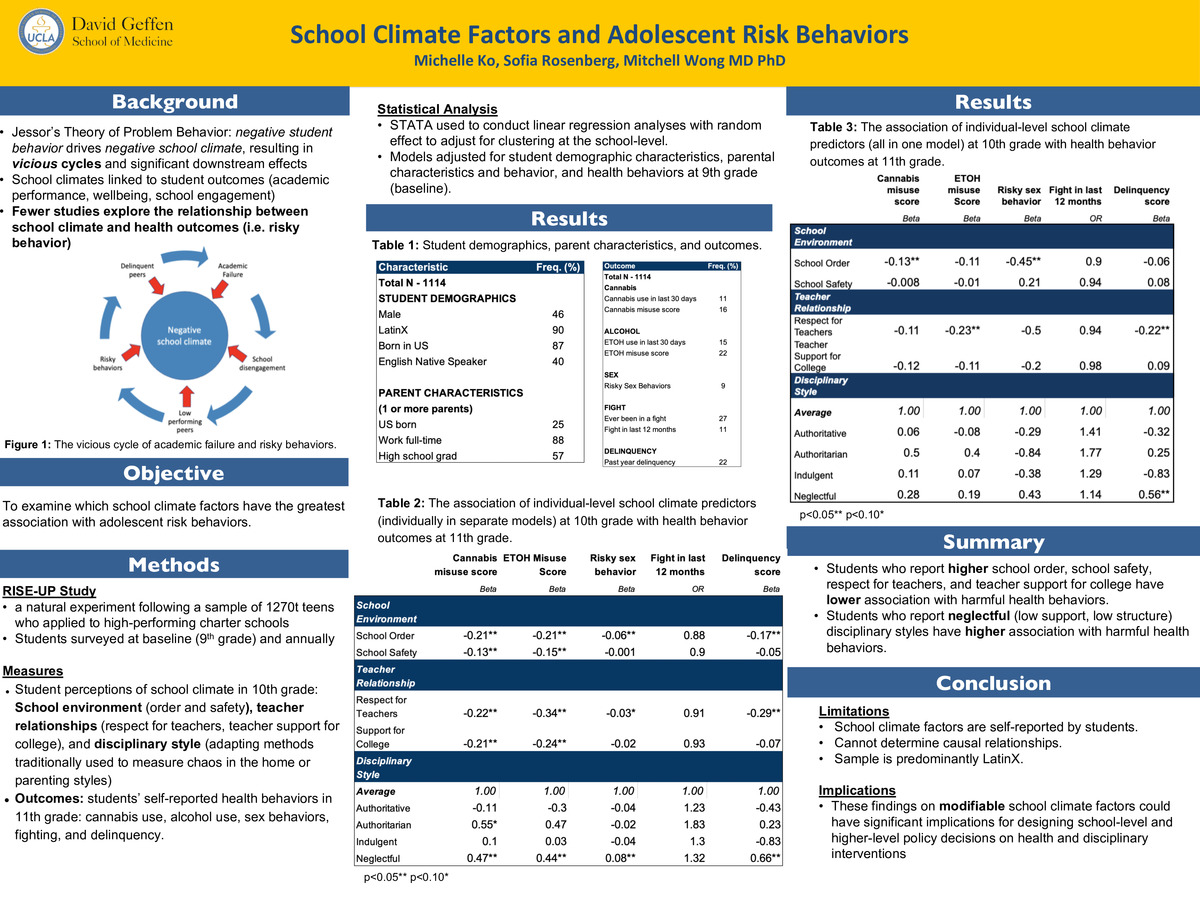-
Author
Michelle Ko -
PI
Mitchell Wong, MD PhD
-
Co-Author
Sofia Rosenberg
-
Title
School Climate Factors and Adolescent Risk Behaviors
-
Program
STTP
-
Other Program (if not listed above)
-
Abstract
Intro
Jessor’s Theory of Problem Behavior suggests that risky student behavior (e.g. substance use and delinquency) drives negative school climate and vice versa, resulting in a vicious cycle, which may have significant downstream effects later in adulthood. The relationship between school climate factors and risky adolescent behaviors is not fully understood.
Objective
To identify which school climate factors have the strongest association with adolescent risk behaviors.
Methods
We analyzed data collected through the RISE-UP (Reducing Health Inequalities through Social and Educational Change Follow-Up) Study, an on-going natural experiment that has followed a sample of high school students (n=1270) since 2013. The original study sampled students who applied for admission into high-performing charter schools in low-income neighborhoods of Los Angeles and compared those who were randomly selected for admission by lottery with those who were not selected. Students were surveyed at baseline (9th grade) and annually.
We examined the relationship between students’ perceptions of school climate in 10th grade and their self-reported health behaviors in 11th grade. We measured several aspects of perceptions of school climate including: school environment (order and safety), teacher relationships (respect for teachers, teacher support for college), and disciplinary style, which was adapted for schools based on a measure of parenting style.
We used STATA 14.0 to conduct linear regression analyses with random effect to adjust for clustering at the school-level. Models were adjusted for student demographic characteristics, parental characteristics and behavior, and baseline health behaviors in 9th grade.
Results
Of the students in the RISE-UP sample who completed the 10th grade and 11th grade survey (n=1114), a little less than half were male (46%) and English native speakers (40%) while the majority were LatinX (90%) and born in the US (87%).
Table 3 shows the results of adjusted multivariable regression models, in which all school climate factors were analyzed together in one model. Student perceptions of school order, respect for teachers, and disciplinary style in 10th grade were the strongest predictors for health outcomes in 11th grade. For example, a 1 standard deviation increase in perception of school order was associated with a 0.13 decrease in Cannabis misuse score (p=0.049) and a 0.45 decrease in risky sex behavior (p<0.001). A 1 standard deviation increase in respect for teachers was associated with a 0.23 decrease in ETOH misuse score (p=0.01) and a 0.22 decrease in delinquency score (p=0.02). Students who reported neglectful disciplinary styles had a 0.56 increase in delinquency score (p=0.004).
In summary, students who reported higher school order, school safety, respect for teachers, and teacher support for college had lower association with harmful health behaviors. Students who reported neglectful (low support, low structure) disciplinary styles had higher association with harmful health behaviors.
Conclusion
A prior study of school climate factors showed a strong and consistent relationship between authoritative disciplinary style and a wide range of better mental health outcomes. In contrast, for risk behaviors, no single school climate factor was associated with all of the behaviors. However, several of the school climate factors were linked to substance use, high-risk sex, and delinquency. These findings suggest that school climate factors could be important targets for future school-level interventions, which could potentially disrupt the vicious cycle of risky behaviors among adolescents.
-
PDF
-
Zoom
https://uclahs.zoom.us/j/92555937511?pwd=TVFYNFJORDBYSCsvblQvbmg4czhIQT09

